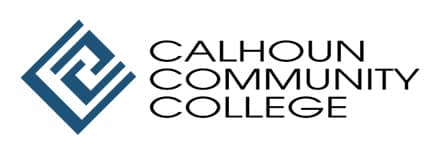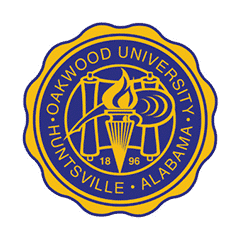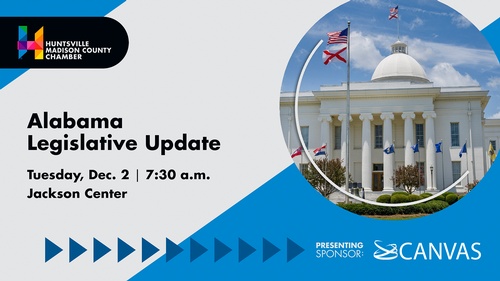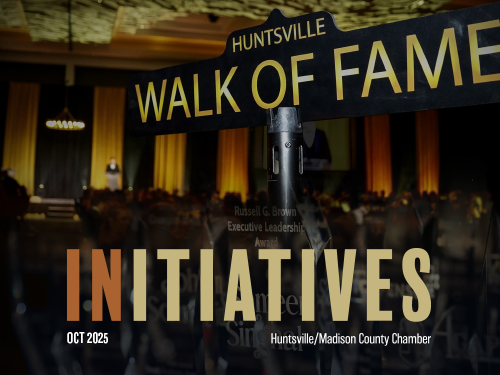[divider height=”20″]
As K-12 Schools announce plans: Stay Flexible
Monitoring communication essential during academic year
By Claire Aiello, Huntsville/Madison County Chamber & Deborah Storey, Contributing Writer
[divider height=”10″]
Educators, community, and business leaders presented a united front on July 22 about the return to school. At a news conference that morning, families learned that all three public school systems in Madison County will start the year with remote learning for the first nine weeks.
This will bring challenges for sure, but was decided due to a number of factors, including the high rate of COVID-19 cases in our local community and the ‘unknown’ of reintroducing a large number of students and staff back in school buildings.
“We are here today – three superintendents, but with one voice, one common goal, and that is to make sure that the best decision possible will be made for our students, our faculty, our staff, and our community,” said Superintendent Allen Perkins, Madison County Schools.
“It was not a decision that any of us took lightly,” said Superintendent Christie Finley, Huntsville City Schools. “We reached this by assessing the current public health situation in north Alabama and across the state, and weighing the impact a full school reopening would have on the health of our city.”
All stressed that we are in unprecedented times, and the situation remains fluid. Administrators acknowledged the school year will require everyone to stay up to date on communications, and to be patient and flexible. “I can tell you this – we will make it a great year at all three school systems,” said Superintendent Dr. Ed Nichols, Madison City Schools. “I can promise you it will be different, but we will make it great.”
School systems will reassess the situation with the pandemic around Labor Day to see if conditions have improved for a possible change to in-person instruction after the first quarter.
Huntsville City Schools is offering families two routes: traditional learning, which would return students to on-campus learning if schools reopen, and Huntsville Virtual Academy, which is a semester commitment that allows students to access materials anywhere, at any time, on a personalized pace and schedule.
Madison City Schools’ learning plan also combines on-site and distance learning for the system’s 10,000+ students, if school buildings open mid-fall.
Madison County Schools offer a program called “Digital Backpack” that allows students to learn online, said spokesman Tim Hall.
“We worked to enhance student learning by providing digital education, but at the same time, we provided paper packets to any student or parent who felt that was best for their student,” Hall said.
Community Support
Remote learning will not be easy for many families, including parents who work. During the announcement, an appeal was made for businesses to extend teleworking policies and flex time where possible. In fact, Business Insider recently reported that 44 percent of our workforce was able to telework in the early months of the pandemic.
In addition, childcare is a major concern for many working families. For one, it’s challenging to afford, and it’s even more tough to find a provider right now.
“Before COVID, we had a childcare gap of more than 22,000 in our Congressional district. That many children were needing childcare but couldn’t access it,” said Lucia Cape, the Huntsville/Madison County Chamber’s senior vice president of Economic Development, Industry Relations, and Workforce. “Safety measures have forced some centers to close and reduced the capacity of centers that have stayed open. Adding school-age children who need supervision and support will have an impact we haven’t even assessed yet.”
The Chamber’s Childcare Taskforce is looking into these issues and working with community partners and the school districts to identify solutions.
Please check for updates on each school system on their websites, huntsvillecityschools.org, madisoncity.k12.al.us, and mcssk12.org.
Additional School Plans
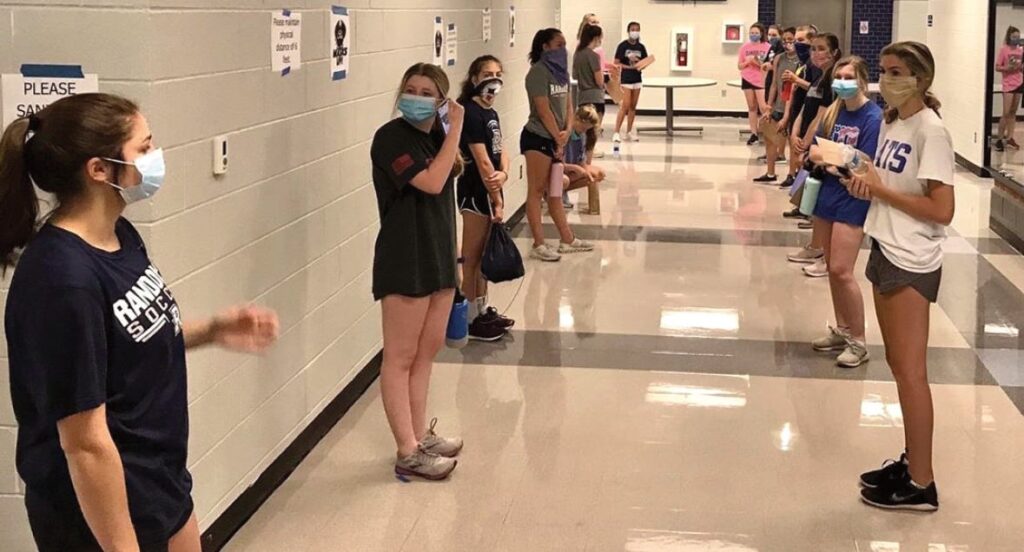
Roughly 350 students attend grades 9-12 at St. John Paul II Catholic High School, a private prep school in Huntsville. They, too, started remote learning in March.
“The greatest lesson we learned in the spring was that there’s no replacement for students being on campus,” said Headmaster Dr. Jeremiah Russell. “While we are planning for face-to-face instruction, we are also developing contingency plans, if health and safety guidelines change or if we need to close campus and go fully remote again.”
Depending on restrictions, students may be able to remove masks during classes because desks will be six feet apart. “Though we’ll be on campus, it will look quite different – temperature checks for those entering school, increased cleaning and sanitization, and students eating lunch in their classrooms,” he said.
Entries and exits will be clearly marked, and halls will have directional signs. Gatherings for athletics, Mass, retreats, and lunch will have to meet distancing guidelines. “If we aren’t able to run our normal schedule, then we are also working on hybrid alternatives that include both on-campus and remote learning,” Russell said.
Randolph is also closely watching developments with COVID-19 as it prepares for students to return.
Head of School Adam Dubé said the private academy’s master contingency plan outlines four levels of operation ranging from open as normal to closing the campus. Face coverings will be required when distancing is not possible.
Following the remote learning joint announcement by City and County schools on July 22, Randolph School planned to open August 20 under its Level Three Learning plan. That is a hybrid model that blends on-campus and virtual teaching and learning with a reduced number of students on campus at a given time.
“We are considering the developmental needs and differences of students, and our policies will be created to account for these differences, using clear face shields in tutoring or other situations where non-verbal communication is critical,” said Dubé.
HIGHER EDUCATION
Moving Forward: Stay Connected
Local colleges, universities fine-tune plans for fall semester
By Sam Smythe Intern, Marketing & Communications
[divider height=”10″]
Colleges continue with their planning for students to return in the fall. They have been working for the past several months to address multiple aspects of classroom interactions and campus life. We checked with local 2-year and 4-year colleges and universities in mid-July, realizing things could change after our print deadline. For that reason, we urge you to check with your school for any new details that have emerged.
The University of Alabama in Huntsville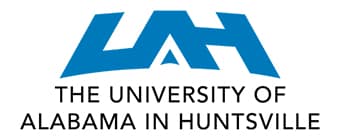
UAH released a detailed document on uah.edu describing their plans to keep students and faculty safe this upcoming semester. UAH will reopen, and planning incorporates leadership and representation from across the entire campus community. Re-opening will include federal, state, and local government guidance and will be guided by health and medical officials. UAH said it will focus on the health and well-being of everyone who steps foot on the campus. UAH will continue to provide updates across their various platforms including their website (uah.edu), campus messages, and social media.
“The entire UAH community has worked tirelessly to respond to the COVID pandemic and plan for the short and long-term impacts that will be left in its wake,” said UAH President Darren Dawson. “We have developed a plan that outlines efforts by the university community to develop a flexible approach to re-open campus while considering adjustments to be made if conditions change. By committing to a caring culture that starts with our personal behavior and acceptance of responsibility, this plan prioritizes the health and well-being of all our students, faculty, staff, vendors, volunteers, and visitors and provides a roadmap for continuing to provide exceptional educational, research, and engagement programs.”
Alabama A&M University
AAMU will also reopen the campus for students this fall and follow a hybrid instruction model that includes both in-class and online instruction. The first day of class is August 17. AAMU is asking students who live on campus to comply with their updated move-in schedule to ensure the safety of students and families. They will also implement temperature checks when entering high traffic facilities, social distancing, and face coverings for everyone when on campus in public spaces, sneeze guards in high traffic offices, increased sanitizing stations, and reduced capacity in the dining halls. Visit aamu.edu for more information.
Drake State Community & Technical College
Students enrolled at Drake State this fall will also have the benefit of a hybrid learning environment. With strong technical and lab-based programs, the college will utilize remote learning in combination with in-person instruction where safe and appropriate. It has implemented a safety plan which includes screening students, cleaning and sanitization according to federal and state recommendations, and making accommodations for proper social distancing.
Keeping students and employees informed of current best safety practices will remain a priority through the semester, which will begin August 17. All in-person instruction will end November 20. Remote learning will continue to the end of the semester on December 11. For updates, check drakestate.edu.
“It is challenging to find the right balance between the need for quality education and protecting the health of our students and employees,” said Drake State President Dr. Patricia Sims. “Being flexible and innovative enables us to serve our students as safely as possible.”
At press time, Calhoun Community College was working with the Alabama Community College System to finalize its fall semester plans and planned to make an announcement soon. Please refer to calhoun.edu for updates.
Oakwood announced, in their reopening plan, three scenarios that will give them flexibility depending on the resurgence of COVID-19. These include on-campus operations (face-to-face learning with social distancing), hybrid learning (remote and face-to-face learning), and complete remote learning and operations. At this time, the primary plan is face-to-face learning and operations with plans to reopen the campus on August 1. Updates will be on their website: oakwood.edu.
ASCTE Prepares for First Year: Stay Focused
AL School of Cyber Technology & Engineering ready to start
By Sarah Blackmon Administrative Coordinator, Finance & Administration
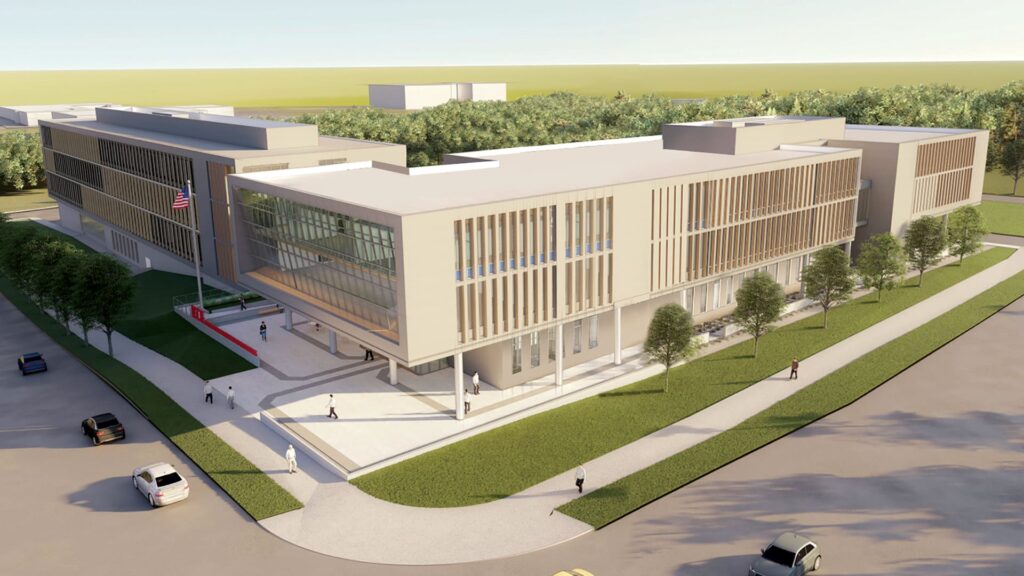
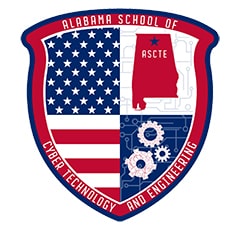 The Alabama School of Cyber Technology and Engineering is scheduled to open August 17 at its temporary location at Oakwood University. This is the state’s only fully public, residential high school for students seeking advanced studies in engineering and cyber technology. It is the first year for the new state magnet school, which will serve approximately 75 students in the first year, with plans to increase enrollment to 300 in the coming years. Construction will soon begin on the school’s permanent campus, at the corner of Bradford and Wynn Drives in Cummings Research Park.
The Alabama School of Cyber Technology and Engineering is scheduled to open August 17 at its temporary location at Oakwood University. This is the state’s only fully public, residential high school for students seeking advanced studies in engineering and cyber technology. It is the first year for the new state magnet school, which will serve approximately 75 students in the first year, with plans to increase enrollment to 300 in the coming years. Construction will soon begin on the school’s permanent campus, at the corner of Bradford and Wynn Drives in Cummings Research Park.
ASCTE leaders are taking the threat of COVID-19 very seriously and will open this fall under the CDC’s guidelines to ensure all faculty, staff, and students are able to learn in a safe and healthy environment. School President Matt Massey said every effort will be made to sanitize the campus dormitories, classrooms, and labs throughout the day. Temperature checks will be required of the faculty, staff, commuting students, and boarding students. Face coverings will also be required to ensure everyone’s safety. There will be a preventive approach to minimize the “level of spread” for the school. An FAQ will be available on ascte.org.
“We are excited to start the school year with such incredible students and elite faculty,” said Massey. “We have students from all across the state, and it’s awesome to see how the industry community supports these efforts.”
Fundraising has been a major focus for the school’s Foundation. This is a state magnet school, so there is no cost for students to attend, but there is a high cost associated with running a residential high school with students from across Alabama. The State provides operation funding for the school but not costs associated with the school’s construction, making the ASCTE Foundation’s role so crucial.
To date, donors have contributed $12 million to the Foundation. Many are Huntsville-area companies who have expressed the need for more workers trained in cyber technology.
“This is a dream come true for kids across the state of Alabama and our business partners who have invested in this school,” said Alicia Ryan, vice chair of the ASCTE Board and president of the ASCTE Foundation. “We look forward to these children joining the workforce with the critical skills we need today and into the future in cyber and engineering. I am personally looking forward to meeting children who will attend our school representing counties across the whole state of Alabama.”
If you would like to contribute, please reach out to ASCTE Foundation Director PeggyLee Wright: [email protected]. Wright hints there will be a surprise announcement on the first day of school!
This article appears in the August 2020 issue of Initiatives magazine, a publication of the Huntsville/Madison County Chamber.


